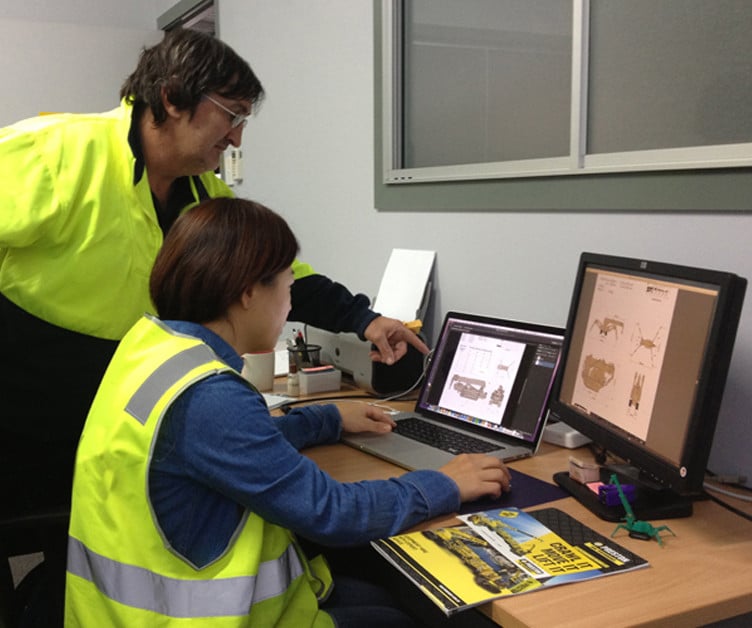
News
October 14, 2024
Preston Hire to Join Industry Leaders at CICA National Conference 2024 Preston Hire is excited to announce we’ll be attending the upcoming CICA National Conference! The […]
October 4, 2024
The construction industry is undergoing a transformation, with sustainability becoming a driving force behind many innovations. As the world increasingly focuses on reducing carbon footprints and […]
October 1, 2024
The Vital Role of Mini Excavators in Utility Projects When you’re managing a utility project, the pressure is on to meet deadlines and stay within budget […]
September 23, 2024
SANY SY135C: The Ultimate Excavator for Power, Precision, and Efficiency When it comes to heavy-duty construction projects, having the right excavation equipment can make all the […]
September 19, 2024
Preston Hire Joins the Civil Contractors Federation Queensland Preston Hire is proud to announce that we are now members of the Civil Contractors Federation Queensland […]
September 12, 2024
When embarking on a construction project, especially those involving heavy lifting, choosing the right crane is crucial. The difference between a smoothly run project and one […]
September 3, 2024
SANY SY155U: Compact Power in a 16-Tonne Excavator When it comes to tough construction projects, especially in tight spaces, having the right excavation equipment is crucial. […]
August 16, 2024
Why Hydraulic Crawler Cranes Are Ideal for Infrastructure Projects Did you know that over 70% of project delays in the construction industry are due to equipment […]
August 13, 2024
4 Reasons Why Preston Hire’s Mini Cranes are the Best Solution for HVAC and Roofing Projects Need to lift a Heating and Ventilation Air Conditioning (HVAC) […]
August 13, 2024
How Mini Excavator Hire Can Help Streamline Landscaping Projects Mini excavators are versatile and powerful diggers, making them a popular choice for the earthmoving needs of […]
July 22, 2024
The SuperDeck® Difference: SuperDeck® vs. Fixed Platforms Loading platforms are used to safely handle and deliver construction materials into multi-storey structures. Although both the SuperDeck® and […]
June 21, 2024
4 Questions to Ask When Hiring a Mini Excavator Preston Hire has proudly established a reputation for our trusted, safe and reliable equipment. Our ability to […]
June 6, 2024
Preston Hire’s Transition to a Sustainable Fleet Preston Hire recently took delivery of a battery powered Maeda MC305CB, a 2.98 tonne capacity mini telescopic crawler with […]
May 20, 2024
5 Applications You Didn’t Know You Could Achieve with Your Excavator Hire It’s common knowledge that excavators excel when it comes to digging and earthmoving requirements […]
April 24, 2024
Enhance Your Operational Efficiency With the Right Construction Tool The construction industry is an important contributor to the Australian economy, employing over one million people and […]
April 18, 2024
How Mini Cranes Assist with Utility Installation and Maintenance Projects At Preston Hire, we’re proud of the flexibility our specialised heavy equipment fleet offers and the […]
February 19, 2024
Unveiling the Benefits of Crane-Assisted Machinery Installation in Manufacturing From milling machines to industrial mixers, the manufacturing sector relies on a range of equipment to aid […]
February 7, 2024
Preston Hire’s mini excavators are perfect for a wide range of tasks on construction sites, such as grading soil, digging trenches, and removing dirt and rocks. […]
February 7, 2024
In the ever-evolving realms of construction and heavy lifting, the utilisation of mini crane hire has emerged as a transformative force, offering a versatile remedy for […]
January 16, 2024
Preston Hire recognises the responsibility of crane owners to make both worksites and equipment as safe as possible. “At Preston Hire, safety isn’t just a priority, it’s a core […]
January 15, 2024
In December 2023, Preston Hire had the privilege of being a major sponsor for the Special Children’s Christmas Party in Brisbane. With multiple parties held nation-wide, […]
December 11, 2023
Lifting operations play a critical role in numerous industries, from manufacturing and construction to shipping and logistics. Designed to hoist and move heavy materials with precision […]
December 4, 2023
With Christmas rapidly approaching, it’s important to consider how to best protect your hired crane when worksites shut down for the holiday season. Hazardous environments even […]
November 3, 2023
At Preston Hire, safety and quality management is at the core of our business. We pride ourselves on presenting the highest quality products and service. This […]
August 10, 2023
By far the most recognisable heavy construction equipment on any worksite due to their size and significance, excavators are used for a wide range of earthworks, […]
August 4, 2023
Preston Hire sponsors AIHL team, the Sydney Bears! Preston Hire is proud to announce that we are a sponsor for the Sydney Bears! We will be […]
June 27, 2023
Glass Handling rig & mini crane package Glazing Industry Solutions Making smart glazing choices can overall improve the atmosphere and safety of your home, building and/or […]
May 25, 2023
SuperDecks the leader of safety; The benefits of high-quality equipment: A construction site can become quite chaotic and busy, with equipment turbulence, workers and members of […]
May 2, 2023
The Preston Hire Crane Guide: Whether it is lifting or transporting materials, cranes are often or not the go-to machine to solve all your construction difficulties […]
April 12, 2023
When working with earth, dirt, rocks, or when moving large volumes of material, earthmoving equipment is often the machinery considered for the task. Earthmoving equipment is […]
April 6, 2023
HOW PRESTON HIRE TAKES THE NEXT STEP…. ALWAYS At Preston Hire, we are committed to meeting our customers’ needs in every possible way. For that exact […]
March 22, 2023
THE BIGGER, BADDER, BETTER GENERATION OF EXCAVATORS: SY265C & SY356C In the last couple of years, excavators have truly become a hot item in the Australian […]
February 27, 2023
If you have numerous construction or at home projects ahead, you may be questioning whether or not its worth hiring or buying equipment to support your […]
January 4, 2023
When it comes to hiring a crane for your next project, you need to know you are using the best equipment for the job. Both crawler […]
October 10, 2022
Preston Hire’s SuperCrane telecrawler fleet has been carefully selected based on the machine’s ability to perform varying tasks and deliver on crucial elements. These include a […]
July 26, 2022
ALWAYS SAFETY FIRST AT PRESTON HIRE Safety and the wellbeing of our staff, customers and all site personnel has always been a key priority for Preston […]
July 14, 2022
Preston Hire’s SuperDeck loading platforms have been in high demand recently, playing an important role on a number of major projects along the east coast. With […]
April 4, 2022
Last month During the devastating floods in Queensland and northern NSW, a callout was made on a community Facebook page where a neighbour’s cow had become […]



































